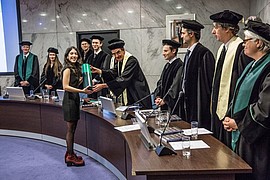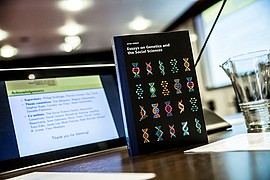PhD Defence: Aysu Okbay

In her dissertation ‘Essays on Genetics and the Social Sciences, ERIM’s Aysu Okbay explores questions at the intersection of economics and biology, and thus contributes to an emerging field of research commonly referred to as: genoeconomics, social-science genetics, biosocial science and biological economics.
Aysu Okbay defended her dissertation in the Senate Hall at Erasmus University Rotterdam on Thursday, 9 February 2017 at 13:30. Her supervisor was Prof. Roy Thurik and her co-supervisors were Prof. Patrick Groenen and Prof. Philipp Koellinger Other members of the Doctoral Committee were Prof. André Uitterlinden (Erasmus MC), Prof. Danielle Posthuma (Vrije Universiteit Amsterdam), Prof. Magnus Johannesson (Stockholm School of Economics), Prof. Cock van Duijn (Erasmus MC), Dr Daniel Benjamin (University of Southern California), and Prof. Stephan Ripke (Broad Institute of MIT and Harvard)
About Aysu Okbay

Aysu Okbay was born on June 17, 1987 in Istanbul, Turkey. She completed her high school education in 2006 at the Istanbul High School in Istanbul. She graduated summa cum laude from Sabanci University, Istanbul, in 2010, with a major in Economics and minor in Mathematics. She continued her studies in Economics at Sabanci University with a focus in Game Theory, and received her Masters degree in 2012. She started her PhD research in August 2012 at the department of Applied Economics in Erasmus University Rotterdam under the supervision of professors Roy Thurik, Philipp Koellinger and Patrick Groenen.
Aysu’s research focuses on questions at the intersection of social sciences and biology. Her main research interest lies in exploring the genetic architecture of complex behavioral outcomes. She has presented her work at various international conferences, such as the annual meetings of Behavior Genetics Association and the CHARGE Consortium. Her research has been published in leading peer-reviewed journals including Nature, Nature Genetics, and PNAS. Aysu is currently continuing her career as an Assistant Professor at the Complex Trait Genetics Lab in Vrije Universiteit Amsterdam, and a core researcher in the Social Science Genetic Association Consortium (SSGAC).
Thesis Abstract

This thesis explores questions at the intersection of economics and biology, and thus contributes to an emerging field of research commonly referred to as: genoeconomics, social-science genetics, biosocial science and biological economics.
Evidence from behavior-genetic studies of twins, adoptees and other pairs of relatives shows that virtually all human traits, including economic preferences and behaviors are at least moderately heritable. With more and more genetic data becoming available, it is increasingly becoming feasible to identify specific genetic variants associated with complex outcomes, thus blurring the disciplinary boundaries between the biological and social sciences. The research described here identifies specific genetic variants robustly associated with a suite of complex outcomes – ranging from educational attainment, to subjective well-being, neuroticism and depression – and shows how these findings can be used, in conjunction with quasi-experimental research designs from economics, to conduct rigorous and well-powered investigations of the interactions between genes and environment. It illustrates some hard-won lessons about the relative merits of various research strategies that have been proposed for efforts to discover genetic associations with complex traits. Furthermore, it provides a framework for quantifying trade-offs between outcome measure heterogeneity and sample-size in gene-discovery efforts.
Though considerable uncertainty remains about the ultimate value of genetic data in the social sciences, the results reported here strongly suggest that there will be at least some settings in which genetic data will prove valuable.
Photos: Chris Gorzeman / Capital Images


